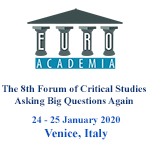Euroacademia Conferences
 Europe Inside-Out: Europe and Europeanness Exposed to Plural Observers (9th Edition) April 24 - 25, 2020
Europe Inside-Out: Europe and Europeanness Exposed to Plural Observers (9th Edition) April 24 - 25, 2020 Identities and Identifications: Politicized Uses of Collective Identities (9th Edition) June 12 - 13, 2020
Identities and Identifications: Politicized Uses of Collective Identities (9th Edition) June 12 - 13, 2020 8th Forum of Critical Studies: Asking Big Questions Again January 24 - 25, 2020
8th Forum of Critical Studies: Asking Big Questions Again January 24 - 25, 2020 Re-Inventing Eastern Europe (7th Edition) December 13 - 14, 2019
Re-Inventing Eastern Europe (7th Edition) December 13 - 14, 2019 The European Union and the Politicization of Europe (8th Edition) October 25 - 26, 2019
The European Union and the Politicization of Europe (8th Edition) October 25 - 26, 2019 Identities and Identifications: Politicized Uses of Collective Identities (8th Edition) June 28 - 29, 2019
Identities and Identifications: Politicized Uses of Collective Identities (8th Edition) June 28 - 29, 2019 The European Union and the Politicization of Europe (7th Edition) January 25 - 26, 2019
The European Union and the Politicization of Europe (7th Edition) January 25 - 26, 2019 7th Forum of Critical Studies: Asking Big Questions Again November 23 - 24, 2018
7th Forum of Critical Studies: Asking Big Questions Again November 23 - 24, 2018 Europe Inside-Out: Europe and Europeanness Exposed to Plural Observers (8th Edition) September 28 - 30, 2018
Europe Inside-Out: Europe and Europeanness Exposed to Plural Observers (8th Edition) September 28 - 30, 2018 Identities and Identifications: Politicized Uses of Collective Identities (7th Edition) June 14 - 15, 2018
Identities and Identifications: Politicized Uses of Collective Identities (7th Edition) June 14 - 15, 2018
Language Gap Between Democratic and Authoritarian Discourses: Critical Discourse Analysis of the Interwar Central European Regimes
-
-

-
Presentation speakers
- Jan Květina, The Institute of History of the Czech Academy of Sciences, Czech Republic
Abstract:
Although critical discourse analysis has been initially formed to unmask the contemporary injustice and inequalities in the framework of prevailing language structures, its application might come in handy also for the interpretation of the past political discourses. This is especially true for the research of the “fine line” between democratic and non-democratic systems, whose identification and classification have been traditionally burdened with the dominant focus on the objective institutional, economic and social differences. Nonetheless, if one accepts the constructivist and language nature of social reality, it is required to take into account that one of the most important boundaries between authoritarian and democratic societies – which are however most hidden at the same time – are the ones concerning mentality and rhetoric. In this regard, the question of the official governmental discourse and its impact on the political culture is the crucial one, since the way the elite coded its policies into the “official language” was decisive both for stability of the regime and its ideological depiction for the public. Concerning the particular Central European context, the issue of democratic and non-democratic language can be considered as highly urgent not only due to the current trend of labelling local political systems as “defective democracies”, but also due to the socialist heritage which tended to distinguish between “people’s democratic” and non-democratic “fascist” regimes of the past in a very clear-cut and ideological way. The critical discourse analysis is thus able to employ more sensitive approach towards the research of local authoritarian traditions and to interpret the clash between democratic and non-democratic tendencies not as a one-shot institutional coup d’état, but as a question of gradual and “sneaky” modification of language structures. Hence, regarding the research of Central European non-democratic mentality in the interwar period, it is desirable to focus mainly on these below-mentioned questions: 1) how was the meaning of democracy transformed for particular political reasons of conservative elites between 1918–1938?; 2) Which new rhetorical figures and connotations were introduced into the “authoritarianised” political discourse of that time?; 3) In which way are the non-democratic figures and phrases from the interwar period used in the current political environment?
-
Related Presentations













